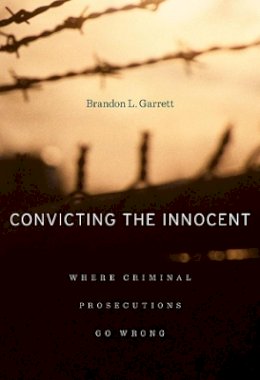
Convicting the Innocent: Where Criminal Prosecutions Go Wrong
Brandon L. Garrett
On January 20, 1984, Earl Washington—defended for all of forty minutes by a lawyer who had never tried a death penalty case—was found guilty of rape and murder in the state of Virginia and sentenced to death. After nine years on death row, DNA testing cast doubt on his conviction and saved his life. However, he spent another eight years in prison before more sophisticated DNA technology proved his innocence and convicted the guilty man.
DNA exonerations have shattered confidence in the criminal justice system by exposing how often we have convicted the innocent and let the guilty walk free. In this unsettling in-depth analysis, Brandon Garrett examines what went wrong in the cases of the first 250 wrongfully convicted people to be exonerated by DNA testing.
Based on trial transcripts, Garrett’s investigation into the causes of wrongful convictions reveals larger patterns of incompetence, abuse, and error. Evidence corrupted by suggestive eyewitness procedures, coercive interrogations, unsound and unreliable forensics, shoddy investigative practices, cognitive bias, and poor lawyering illustrates the weaknesses built into our current criminal justice system. Garrett proposes practical reforms that rely more on documented, recorded, and audited evidence, and less on fallible human memory.
Very few crimes committed in the United States involve biological evidence that can be tested using DNA. How many unjust convictions are there that we will never discover? Convicting the Innocent makes a powerful case for systemic reforms to improve the accuracy of all criminal cases.
Product Details
About Brandon L. Garrett
Reviews for Convicting the Innocent: Where Criminal Prosecutions Go Wrong
Jeffrey Rosen
New York Times Book Review
Garrett’s book zooms out the view to give the reader a sense of the scope of the problems in our justice systems. But he does so in a way which I find both earnest and charitable.
Andrew Cohen
The Atlantic
A uniquely valuable part of Garrett’s book is a statistical appendix that provides a quantitative overview of the false convictions, their consequences, and the factors that contributed to them… It is hard to imagine seven pages more damaging to the claims of our system of criminal justice.
Richard C. Lewontin
New York Review of Books
Looking at the 250 people exonerated through DNA as of February 2010, Garrett aimed to determine how often…malignant factors had warped the criminal justice process at the expense of an innocent person (and to the benefit of an actual criminal who went unpursued). Garrett tracked down court transcripts and dug into case files. He then sliced, diced, sifted and collated the data. Some law professors would take a pass on this kind of grunt work. Garrett did not, and our justice system can be the better for it.
Kevin Doyle
America
This book details some of the worst miscarriages of justice in U.S. history and describes how DNA evidence helped to right those wrongs… The book, what must be the most thorough treatment yet of wrongful convictions, is a first-rate examination of the human foibles and conflicts of interest hampering the pursuit of justice.
A. C. Mobley
Choice
While false convictions are a recognized phenomenon, Garrett focuses much needed attention on potential solutions, offering concrete suggestions for reform.
Publishers Weekly
For six years now I have worked diligently within the innocence movement, and I often hear the question: ‘How do wrongful convictions happen?’ Convicting the Innocent gives all the answers. It is a fascinating study of what goes wrong, and it clearly shows that virtually all wrongful convictions could have been avoided.
John Grisham DNA testing is revolutionizing our system of criminal justice: this book shows why. By digging deep into the case files of exonerees, Brandon Garrett uncovers what went wrong in those cases and probably in many more we simply can’t know about. Garrett makes a powerful case for how to improve criminal justice so that we dramatically reduce the number of wrongly convicted.
Barry Scheck and Peter Neufeld, The Innocence Project This is an invaluable book, a comprehensive, highly readable but well-researched work examining the hows and whys of the law’s ultimate nightmare—convicting the innocent.
Scott Turow, author of Innocent It’s common to say that DNA exonerations of innocent defendants provide a unique window on the weaknesses in our system of criminal investigation and trial. But what exactly do we see when we look through that window? Until now the answer has been pretty sketchy. Brandon Garrett has produced a far more detailed and complete picture of the lessons of DNA exonerations than anything else to date. This is an indispensable book for anyone wanting to understand or improve American criminal justice.
Samuel R. Gross, Thomas and Mabel Long Professor of Law, University of Michigan How can we stop sending innocent people to our prisons? As you turn the pages of this important and startling book, you will come to realize that wrongful convictions are not accidents. They are the tragic result of a criminal justice system in deep need of reform.
Sister Helen Prejean, author of Dead Man Walking
